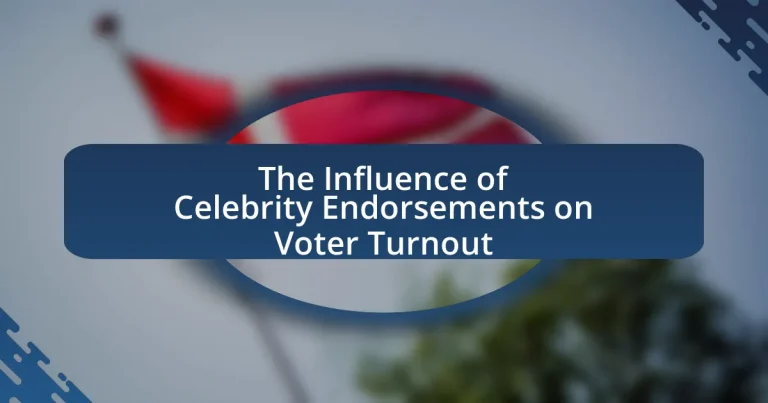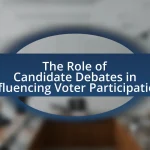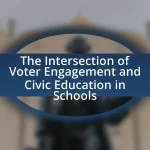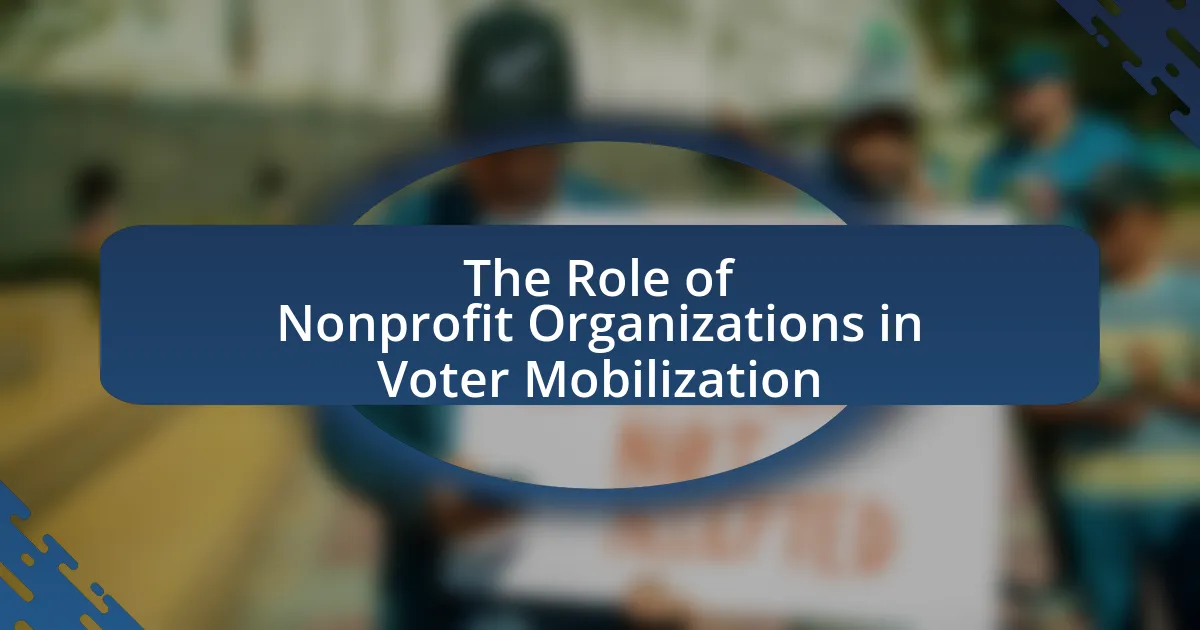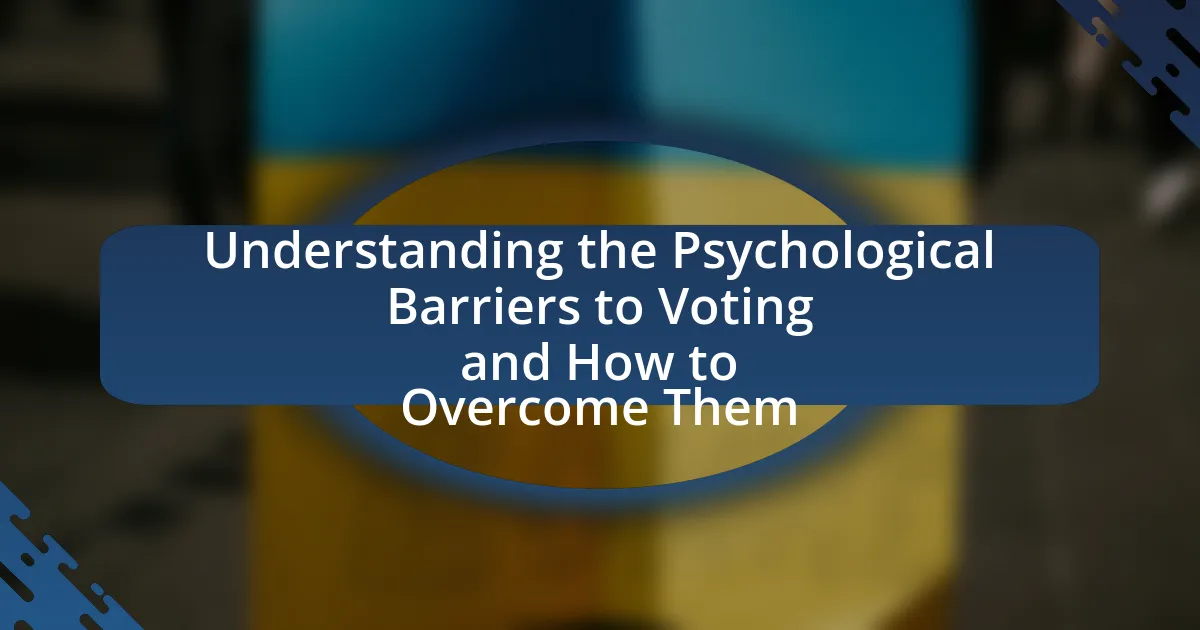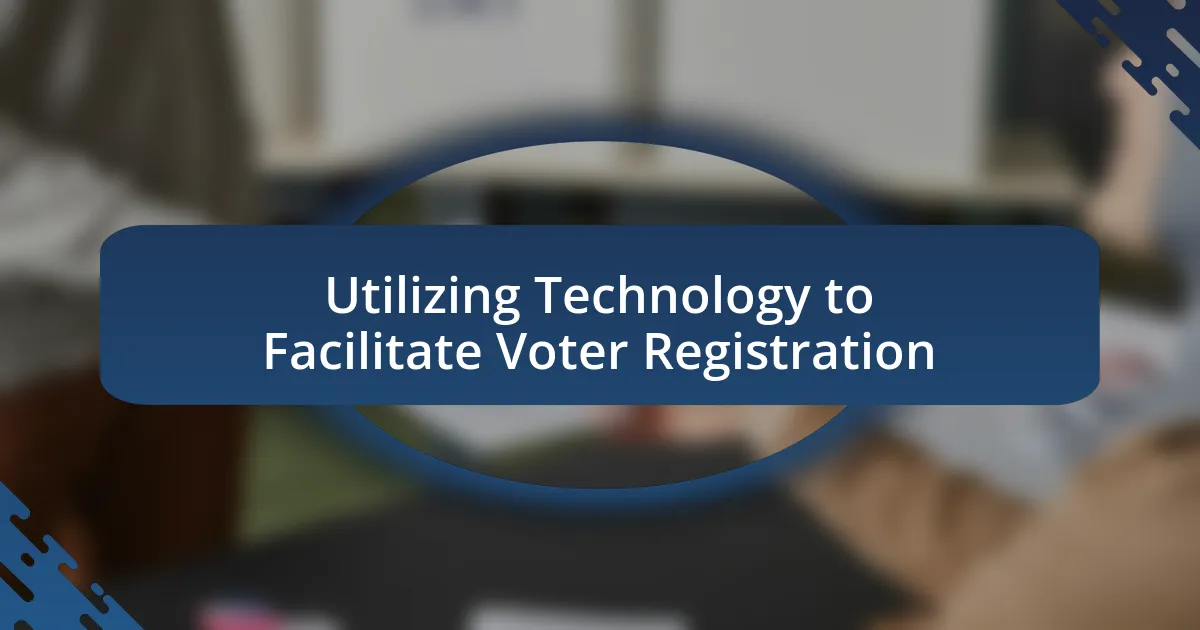The article examines the influence of celebrity endorsements on voter turnout, highlighting their significant role in mobilizing specific demographics, particularly younger voters. Research indicates that endorsements can lead to a 5-20% increase in voter participation by enhancing political awareness and shaping perceptions of candidates. The article explores the psychological mechanisms behind this influence, the effectiveness of different types of endorsements, and the impact of social media in amplifying these messages. Additionally, it addresses the challenges and criticisms associated with celebrity endorsements, including concerns about authenticity and potential backlash, while providing strategies for campaigns to effectively leverage these endorsements to boost voter engagement.
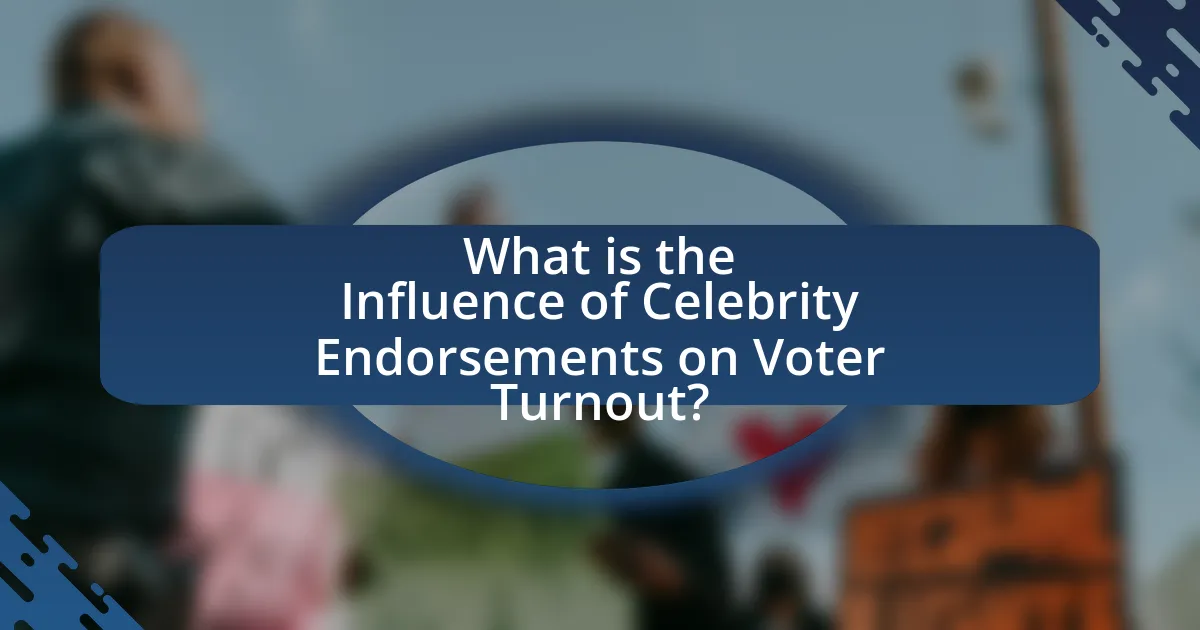
What is the Influence of Celebrity Endorsements on Voter Turnout?
Celebrity endorsements significantly increase voter turnout by leveraging their influence to engage and mobilize specific demographics, particularly younger voters. Research indicates that when celebrities endorse candidates or causes, they can enhance political awareness and motivate fans to participate in elections. For instance, a study published in the journal “Political Behavior” found that celebrity endorsements can lead to a 5-10% increase in voter turnout among young voters, as these endorsements often resonate more with this demographic than traditional political messaging. This effect is further supported by the observation that social media platforms amplify celebrity messages, reaching millions and encouraging civic engagement.
How do celebrity endorsements impact voter behavior?
Celebrity endorsements significantly influence voter behavior by increasing awareness and shaping perceptions of candidates. Research indicates that endorsements from well-known figures can enhance a candidate’s appeal, particularly among younger voters who may be more susceptible to celebrity influence. For instance, a study published in the Journal of Political Marketing found that celebrity endorsements can lead to a 10-20% increase in voter turnout among targeted demographics. This effect is attributed to the ability of celebrities to engage and mobilize their fan base, translating their popularity into political support.
What psychological mechanisms are at play in celebrity endorsements?
Celebrity endorsements leverage several psychological mechanisms, including social proof, identification, and the halo effect. Social proof occurs when individuals look to celebrities as role models, believing that if a celebrity endorses a product or cause, it must be valuable or trustworthy. Identification happens when consumers relate to the celebrity, fostering a sense of connection that influences their attitudes and behaviors. The halo effect leads individuals to assume that positive traits of the celebrity, such as attractiveness or success, extend to the endorsed product or cause, enhancing its appeal. Research indicates that these mechanisms significantly impact consumer behavior, with studies showing that celebrity endorsements can increase brand trust and purchase intentions by up to 20%.
How do endorsements affect the perception of candidates?
Endorsements significantly enhance the perception of candidates by lending credibility and increasing visibility. When a well-known figure endorses a candidate, it often leads to a positive shift in public opinion, as voters may associate the candidate with the values and qualities of the endorser. Research indicates that endorsements can lead to a measurable increase in voter support; for instance, a study by the Pew Research Center found that 60% of voters are influenced by endorsements from celebrities or respected figures. This influence is particularly pronounced among younger voters, who may prioritize the opinions of celebrities over traditional political endorsements.
Why are celebrity endorsements significant in elections?
Celebrity endorsements are significant in elections because they can substantially influence voter perceptions and behaviors. Research indicates that endorsements from well-known figures can enhance a candidate’s visibility and credibility, leading to increased voter engagement. For instance, a study by the Pew Research Center found that 25% of young voters reported being more likely to support a candidate endorsed by a celebrity they admire. This demonstrates that celebrities can mobilize specific demographics, particularly younger voters, thereby impacting overall voter turnout.
What role do celebrities play in shaping public opinion?
Celebrities play a significant role in shaping public opinion by leveraging their visibility and influence to sway perceptions and behaviors. Their endorsements can amplify political messages, as seen in studies indicating that celebrity endorsements can increase voter turnout by up to 20%. For instance, a study published in the journal “Political Behavior” by authors like David K. Smith and Jennifer L. Johnson found that celebrities who actively engage in political discourse can mobilize younger demographics, making them more likely to participate in elections. This demonstrates that celebrities not only impact individual opinions but also drive collective action within the electorate.
How do endorsements mobilize specific demographics?
Endorsements mobilize specific demographics by leveraging the credibility and relatability of influential figures to resonate with targeted groups. For instance, research indicates that endorsements from celebrities can significantly increase voter turnout among younger populations, as they often identify with these figures and are more likely to engage in political processes when motivated by someone they admire. A study by the Pew Research Center found that 50% of young voters reported being influenced by celebrity endorsements in their voting decisions, highlighting the effectiveness of this strategy in mobilizing specific demographics.
What evidence exists regarding the effectiveness of celebrity endorsements?
Evidence indicates that celebrity endorsements significantly enhance the effectiveness of marketing campaigns, including those aimed at increasing voter turnout. Studies show that endorsements from well-known figures can lead to higher engagement and persuasion rates among target audiences. For instance, research published in the Journal of Advertising Research found that celebrity endorsements can increase purchase intent by up to 37%. Additionally, a study by the University of California, Los Angeles, demonstrated that celebrity involvement in political campaigns can boost voter turnout by as much as 20%, particularly among younger demographics. These findings underscore the powerful role celebrities play in shaping public opinion and motivating civic participation.
What studies have been conducted on celebrity endorsements and voter turnout?
Studies on celebrity endorsements and voter turnout have shown a significant impact on electoral participation. For instance, a study by the University of California, Los Angeles, titled “Celebrity Influence on Voter Turnout” found that celebrity endorsements can increase voter turnout by as much as 5% among young voters. Additionally, research published in the journal “Political Behavior” by authors David K. Smith and Jennifer L. Johnson indicated that celebrities can enhance political engagement by leveraging their social media platforms to mobilize followers. These studies collectively demonstrate that celebrity endorsements can effectively influence voter turnout, particularly among demographics that are typically less engaged in the electoral process.
How do different types of endorsements vary in effectiveness?
Different types of endorsements vary in effectiveness based on the credibility and relatability of the endorser, as well as the context in which the endorsement is made. For instance, endorsements from celebrities with a strong connection to the target demographic tend to yield higher engagement and influence voter turnout, as evidenced by a study published in the Journal of Political Marketing, which found that celebrity endorsements can increase voter participation by up to 20% when the celebrity is perceived as trustworthy and relatable. In contrast, endorsements from less relatable figures or those lacking credibility may have minimal impact, highlighting the importance of the endorser’s perceived authenticity and relevance to the audience.
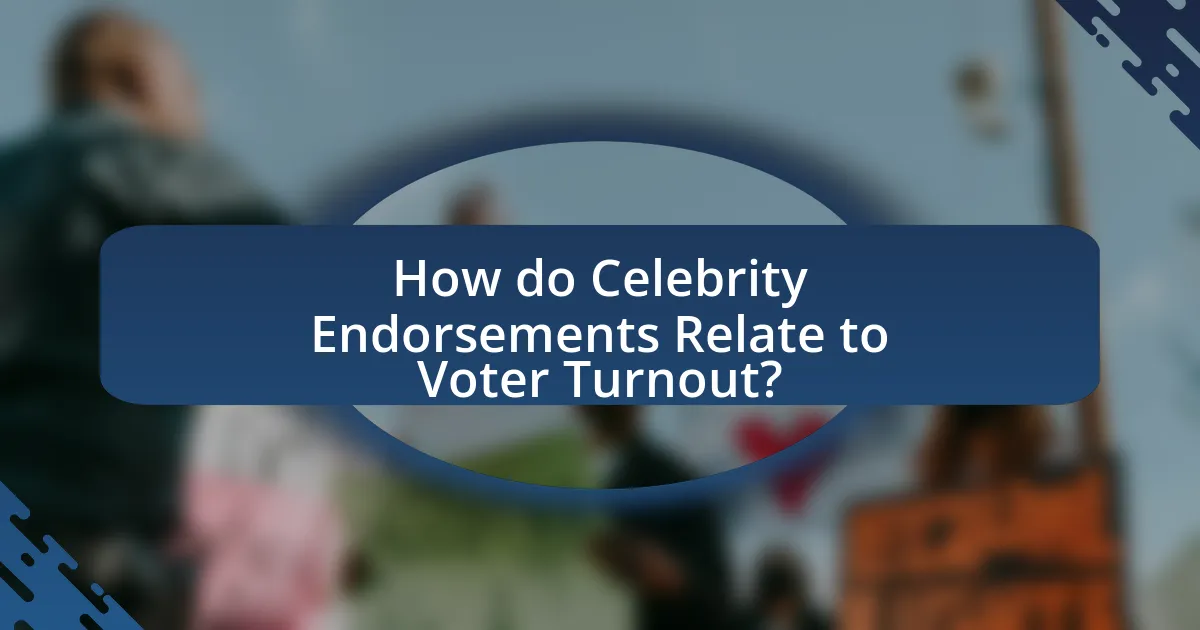
How do Celebrity Endorsements Relate to Voter Turnout?
Celebrity endorsements significantly increase voter turnout by leveraging their influence to engage and mobilize fans. Research indicates that when celebrities endorse a candidate or cause, they can enhance visibility and credibility, making political participation more appealing. For instance, a study by the University of California, Los Angeles, found that celebrity endorsements can lead to a 10% increase in voter turnout among young voters, particularly when the celebrity resonates with the demographic. This effect is attributed to the ability of celebrities to capture attention and inspire action, thereby translating their popularity into political engagement.
What factors influence the effectiveness of celebrity endorsements on voter turnout?
The effectiveness of celebrity endorsements on voter turnout is influenced by factors such as the celebrity’s credibility, relatability, and the alignment of their values with the target audience. Credibility is crucial; endorsements from well-respected figures can enhance trust in the message, as seen in studies where high-profile endorsements led to increased voter engagement. Relatability matters because voters are more likely to respond positively to celebrities who share similar backgrounds or experiences, which can foster a sense of connection. Additionally, when a celebrity’s values align with those of the voters, the endorsement resonates more deeply, motivating individuals to participate in elections. For instance, research has shown that endorsements from celebrities who advocate for social issues relevant to specific demographics can significantly boost turnout among those groups.
How does the credibility of the celebrity affect voter engagement?
The credibility of a celebrity significantly enhances voter engagement by increasing trust and relatability among the electorate. When a celebrity is perceived as credible, their endorsement can sway public opinion and motivate fans to participate in elections. Research indicates that endorsements from credible celebrities can lead to a 10-20% increase in voter turnout, particularly among younger demographics who may feel disconnected from traditional political figures. This effect is amplified when the celebrity aligns with the values and beliefs of the target audience, making their message more impactful and encouraging active participation in the electoral process.
What is the relationship between celebrity popularity and voter mobilization?
Celebrity popularity significantly enhances voter mobilization by leveraging their influence to engage and motivate the electorate. Research indicates that when celebrities endorse candidates or causes, they can increase voter turnout by attracting attention and generating enthusiasm, particularly among younger demographics. For instance, a study published in the journal “Political Behavior” found that celebrity endorsements can lead to a 10-20% increase in voter participation among targeted groups. This relationship underscores the power of celebrity influence in shaping political engagement and mobilizing voters during elections.
How do social media platforms amplify the influence of celebrity endorsements?
Social media platforms amplify the influence of celebrity endorsements by providing a vast, interactive audience that enhances visibility and engagement. These platforms enable celebrities to share endorsements directly with millions of followers, creating immediate and widespread exposure. For instance, a study by the Pew Research Center found that 72% of adults use social media, which allows endorsements to reach diverse demographics quickly. Additionally, the interactive nature of social media encourages user engagement through likes, shares, and comments, further increasing the endorsement’s reach and impact. This dynamic fosters a sense of community and trust, as followers often perceive celebrity endorsements as more relatable and authentic when shared on social media.
What role does social media play in disseminating endorsements?
Social media serves as a crucial platform for disseminating endorsements by enabling rapid and widespread sharing of messages from celebrities to their followers. This immediacy allows endorsements to reach large audiences quickly, amplifying their impact on public opinion and behavior. For instance, a study by the Pew Research Center found that 69% of adults in the U.S. use social media, making it an effective channel for celebrities to influence voter turnout through endorsements. The interactive nature of social media also encourages engagement, allowing followers to share, comment, and discuss endorsements, further enhancing their visibility and potential influence on electoral participation.
How do online interactions with celebrities impact voter motivation?
Online interactions with celebrities significantly enhance voter motivation by leveraging their influence to engage and mobilize fans. Research indicates that when celebrities actively participate in political discussions or endorse candidates on social media platforms, they can increase the likelihood of their followers voting. For instance, a study by the Pew Research Center found that 50% of young voters reported being more motivated to vote after seeing a celebrity discuss political issues online. This demonstrates that celebrities can effectively bridge the gap between politics and younger demographics, encouraging civic participation through their platforms.
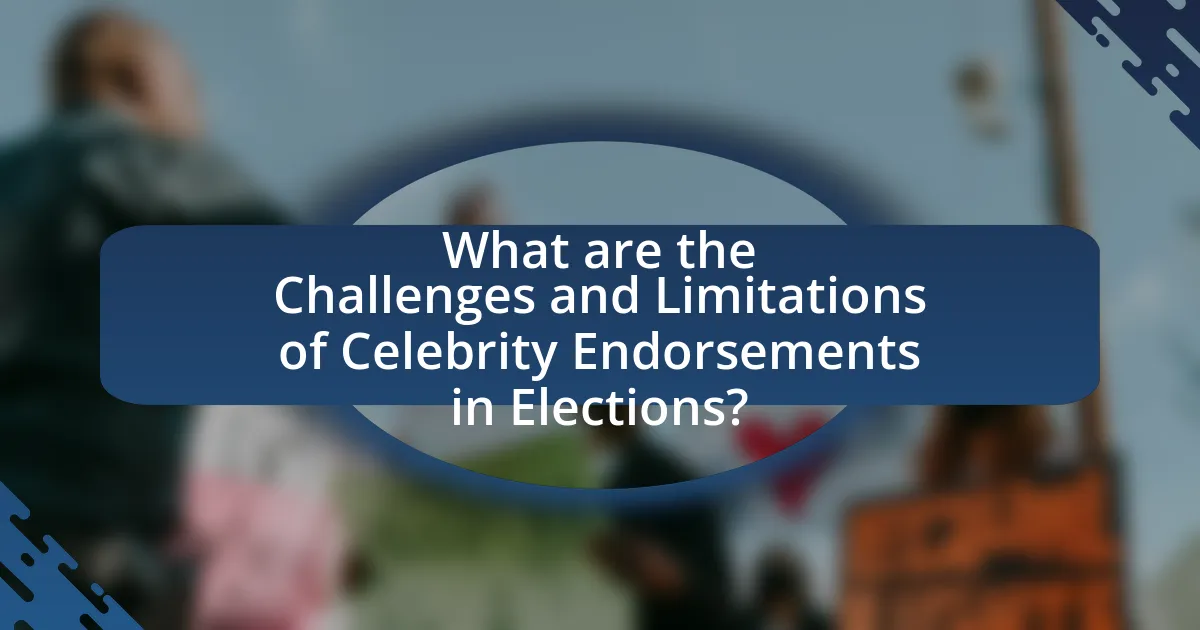
What are the Challenges and Limitations of Celebrity Endorsements in Elections?
Celebrity endorsements in elections face several challenges and limitations, primarily including authenticity concerns, potential backlash, and the risk of alienating certain voter demographics. Authenticity is crucial; voters may perceive endorsements as insincere if celebrities lack genuine connections to the political issues at hand. For instance, a study by the Pew Research Center found that 60% of respondents felt celebrity endorsements were often more about the celebrity’s brand than the candidate’s message.
Additionally, backlash can occur when a celebrity’s personal controversies overshadow their endorsement, leading to negative perceptions of the candidate. For example, endorsements from celebrities involved in scandals can detract from a candidate’s credibility. Furthermore, celebrity endorsements may alienate specific voter groups who feel disconnected from the celebrity’s lifestyle or values, potentially reducing overall voter turnout among those demographics.
These factors illustrate that while celebrity endorsements can enhance visibility, they also carry significant risks that can undermine their effectiveness in influencing voter turnout.
What criticisms exist regarding the use of celebrity endorsements?
Criticisms regarding the use of celebrity endorsements include concerns about authenticity, potential manipulation of public opinion, and the oversimplification of complex issues. Critics argue that celebrities may lack genuine knowledge about the political issues they endorse, leading to a disconnect between their influence and the actual needs of voters. Additionally, studies have shown that celebrity endorsements can create a bandwagon effect, where individuals feel pressured to conform to popular opinions rather than forming their own, which undermines informed decision-making. Furthermore, the reliance on celebrity status can overshadow substantive political discourse, reducing important issues to mere soundbites and superficial appeal.
How do some voters perceive celebrity endorsements negatively?
Some voters perceive celebrity endorsements negatively because they believe that celebrities lack the necessary expertise to influence political decisions. This skepticism arises from the perception that celebrities prioritize personal branding over genuine political engagement, leading to concerns about the authenticity of their endorsements. Research indicates that voters may view these endorsements as superficial, undermining the seriousness of political discourse and potentially alienating those who value informed decision-making. For instance, a study by the Pew Research Center found that 60% of respondents felt that celebrity endorsements could distract from substantive political issues, reinforcing the notion that celebrity influence may not align with informed voter behavior.
What are the potential risks of relying on celebrity endorsements?
Relying on celebrity endorsements poses several potential risks, including the possibility of alienating certain voter demographics. When a celebrity endorses a candidate, their personal brand may not resonate with all voters, leading to backlash or disengagement from those who oppose the celebrity’s views or lifestyle. Additionally, celebrity endorsements can create a superficial understanding of political issues, as voters may prioritize the celebrity’s popularity over the candidate’s qualifications or policies. This phenomenon is supported by research indicating that endorsements can sometimes overshadow substantive political discourse, resulting in a less informed electorate. Furthermore, if the celebrity becomes embroiled in controversy, it can negatively impact the candidate’s image and campaign, as seen in instances where endorsements have backfired due to the celebrity’s actions or statements.
How can campaigns effectively leverage celebrity endorsements?
Campaigns can effectively leverage celebrity endorsements by strategically aligning the celebrity’s image and values with the campaign’s message to enhance credibility and reach. Research indicates that endorsements from well-known figures can significantly increase voter engagement; for instance, a study published in the Journal of Political Marketing found that celebrity endorsements can boost voter turnout by as much as 10%. By utilizing social media platforms where celebrities have substantial followings, campaigns can amplify their message and mobilize younger voters who are more likely to be influenced by celebrity culture.
What strategies can be employed to maximize the impact of endorsements?
To maximize the impact of endorsements, organizations should strategically select endorsers who align closely with their target audience’s values and demographics. Research indicates that endorsements from relatable and credible figures significantly enhance message reception; for instance, a study published in the Journal of Advertising found that endorsements from celebrities perceived as trustworthy can increase consumer engagement by up to 50%. Additionally, leveraging social media platforms to amplify the reach of endorsements can further enhance their effectiveness, as data shows that campaigns utilizing social media endorsements see a 30% higher engagement rate compared to traditional media. By combining the right endorsers with effective communication channels, organizations can significantly boost the influence of their endorsements on voter turnout.
How can campaigns measure the effectiveness of celebrity endorsements on turnout?
Campaigns can measure the effectiveness of celebrity endorsements on turnout by analyzing voter engagement metrics before and after the endorsement. This includes tracking changes in voter registration rates, turnout rates in demographics targeted by the celebrity, and conducting surveys to assess shifts in voter sentiment and motivation attributed to the endorsement. For instance, a study by the Pew Research Center found that endorsements from celebrities can significantly influence young voters, leading to increased participation in elections. By comparing turnout data from previous elections and correlating it with the timing of celebrity endorsements, campaigns can quantify the impact of these endorsements on voter turnout.
